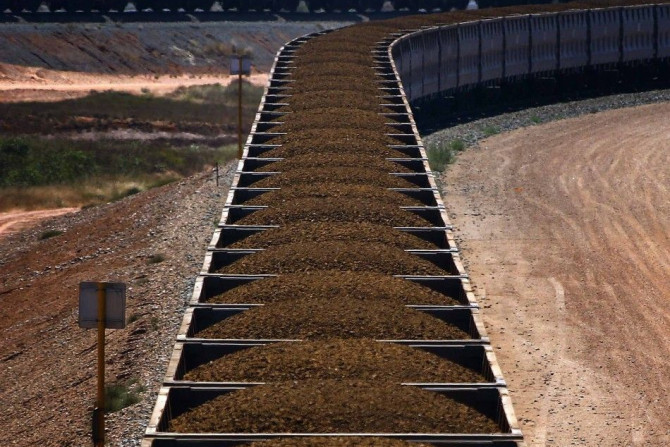US San Francisco Federal Reserve President Williams and Dallas Fed President Fisher spoke at a monetary policy conference. Both speakers agreed that the super-easing monetary policy conditions could have adverse consequences in the long run - resulting in excessive asset price growth and encouraging investors to take on too much risk. However Williams doesn´t believe rates should rise till the second half of 2015.
Iron ore prices are again going down. On Friday night, spot price for the key steelmaking ingredient closed at $100.70 per tonne after a substantial decline in Chinese steel rebar futures which hit a record low.
The Australian share market started the trading week heavily in the red, falling 1.3 per cent on the All Ordinaries Index (XAO) as fears of a burst in China's property bubble impacted mining players and investor sentiment.
The Australian sharemarket is off to its worst start to a week in almost a month and a half, with a slump in iron ore pushing miners substantially lower. At lunch, the All Ordinaries Index (XAO) is down 0.9 per cent, with mining and energy stocks down by at least 1.5 per cent.
At least 44 have died from the worst floods that hit Serbia and Bosnia in more than a century over the weekend. Four days of heavy rainfall had triggered landslides forcing thousands to flee their homes as mud covered villages and roads. Rising flood waters are likewise threatening the power plants in the region.
There is an eerie quiet around markets currently; intraday equities moves are trending back to the value average mean price (VWAP) and currencies are treading water suggesting that fair value is globally priced in, barring the moves seen in the EUR.
In US economic data, housing starts rose by 13.2% in April to an annual rate of 1.072 million - well above expectations. Building permits hit 6-year highs. But consumer sentiment eased from 84.1 to 81.8 in May, short of expectations centred on a reading of 84.5.
Local stocks were under sustained pressure on Friday with the ASX 200 ending the session at the lows of the day. One small consolation was the low level of participation with just over $ 3.8bln shares changing hands.
The worst trading session in five weeks on Wall Street overnight has given the local sharemarket a negative lead this morning. The All Ordinaries Index (XAO) is down 0.5 per cent, with only the defensive utilities managing to remain modestly firmer.
Equities extended their losses overnight with sentiment remaining subdued as European concerns resurfaced. Peripheral bond yields spiked in Europe with investors going defensive and favouring German bunds. US 10-year treasuries rallied to 2.5% as investors continued to flee risk. The carnage in the small cap space also continued with the Russell index extending its losses to contractionary territory. Even a drop below 300,000 for the first time since mid-2007 in unemployment claims to 297,000 wa...
n US economic data, consumer prices rose by 0.3% in May. Food prices lifted for the fourth consecutive months, coupled with a lift in gasoline prices. Prices were up 2% over the year. Excluding volatile food and energy, cosnumer prices increased by 0.2% in April to be up 1.8% over the year. US initial jobless claims fell by 24,000 to 297,000 - a seven year low. US industrial production fell 0.6% after lifting by 0.9% in March.
Despite a $30-billion forecast budget deficit for 2014-15, rating agency Moody's kept Australia's AAA credit rating this week. It also said that compared to other nations with the same tripe A rating, Canberra's growth outlook is still favourable.
The ASX 200 saw a day of consolidation on Thursday ending the session higher by 14 points having seen a 25 point deficit at the lows of the day. There is little on the calendar that is likely to have a lasting impact on the markets until Fed Chair Yellen speaks later tonight local time. Ms Yellen is expected to stick to the recent script which has described, the ongoing slack in the labour market that will require monetary policy to remain accommodative even as the US economic recovery gathers m...
The Australian sharemarket is a touch softer at lunch, with the mining and energy sectors helping minimise losses. Weakness in U.S. markets for the first time in six sessions and a pullback from six-year highs in Europe have given us a negative lead locally.
US equities finally pulled back from record highs, while bonds gained resulting in US treasury yields dropping around seven basis points to their lowest level in six months. Losses in the US were mainly pinned on renewed weakness in the small caps, which encouraged some profit taking across equities. When equities are at record highs, any source of concern generally triggers profit-taking.
In US economic data, producer prices rose by 0.6% in April, the largest increase in 18 months. Prices were up 2.1% over the year to April. Food prices surged by 2.7% in April pushed up by higher meat prices, which recorded their largest increase in 11 years. Producer prices excluding volatile food and energy costs increased by 0.5% in April to be up 1.9% over the year.
A transformer explosion that caused a fire in a coal mine in western Turkey on Wednesday killed at least 201 workers. The accident is considered one of the worst mining disasters in the country's history.
The Australian share market closed flat a day after Treasurer Joe Hockey delivered the Federal Budget. The All Ordinaries Index (XAO) moved just 0.5 of a point higher to finish at 5475.9 points.
The Australian sharemarket is down modestly after yesterday's impressive surge. The All Ordinaries Index (XAO) is down 0.3 per cent at lunch; however this has less to do with last night's Federal Budget and more to do with weakness from the banks.
Last night was always going to be interesting as the 'new fiscal drag' was unveiled. The budget is a great big political beast, and putting the political issues to one side and looking at the budget from a purely market perspective, the ASX as a whole is likely to be breathing easier this morning.
In US economic data, retail sales rose by 0.1% in April, short of forecasts tipping a 0.4% gain. But March data was revised higher. Excluding autos, sales were flat, down on forecasts tipping a 0.6% gain. Import prices fell 0.4% in April with export prices down 1.0%. Both results were softer than expected
The Shangri-La Hotel in the Shard, London, may be the tallest tower in the British capital city, but it offers more than just impressive views of London but also what other hotel guests are doing.
The Australian share market enjoyed a solid gain today, ahead of the release of the 2014 Federal Budget. Our market took its cue from record highs on Wall Street overnight, with the All Ordinaries Index (XAO) adding 0.9 per cent or 46.4 points to 5475.4 points.
Much like Monday's session the ASX 200 started with a flourish this morning. Every sector started with gains although property stocks were the exception. The contrast with the previous session was the improved volume with well over a billion dollars in shares exchanged in the initial hour of trade.
Equities rallied to fresh record highs overnight, with a recovery in tech stocks lifting sentiment. While equities were firmer, currency markets were relatively calm with tight ranges maintained in most of the major currency pairs. USD/JPY was a standout as it finally broke through 102 helped by a wider-than-expected current account deficit figure for Japan aiding renewed yen weakness.
In US economic data, the monthly Federal Budget posted a surplus of US$106.9 billion in April, just short of forecasts centred on US$114 billion.
The Australian share market started the trading week in the red, despite another record high on the US Dow Jones Index on Friday. The All Ordinaries Index (XAO) closed lower by 13 points or 0.2 per cent to 5429 with mining and energy players the biggest drag.
Local shares have kicked off the week on a negative footing ahead of the release of tomorrow night's much anticipated Federal Budget. The All Ordinaries Index (XAO) is down 0.4 per cent despite another record close for U.S. sharemarkets on Friday.
Asia is about to see the 'new normal' from the region's superpower over the coming years as Chinese President Xi Jinping publicly stated the nation will have to adapt to the slower pace of growth on the weekend.
In US economic data, wholesale sales rose by 1.1% in March with inventories up 1.4%. Economists had tipped a 0.5% lift in sales and 0.8% rise in inventories.

















